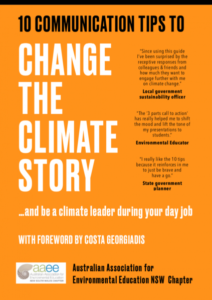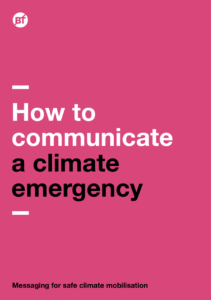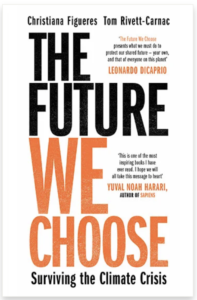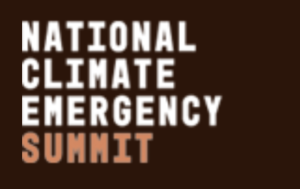Home » Climate Crisis Resource Hub » Educating your community
Educating your community
there are affordable and scalable solutions that exist right now to solve this crisis and create a healthy, just and sustainable world
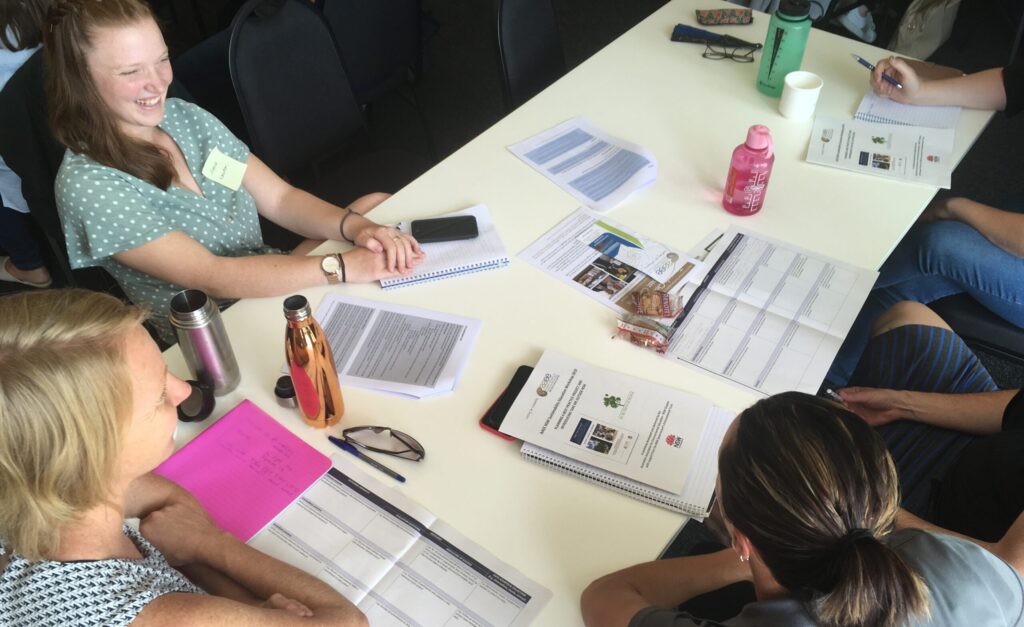
There are many excellent, Australian-specific resources and international approaches to help us effectively communicate with others on the climate crisis and engage with the solutions for a safe climate future.
Below are a range of resources to help you both communicate the urgency of the climate crisis effectively and stay solutions-focused. We know that hope is stronger than fear!
Here are some of our top resources for communicating the science and urgency of the climate crisis
10 Communication Tips to Change the Climate Story …and be a climate leader during your day job
This resource has been developed for anyone concerned about the climate crisis. Written by EE NSW committee member Erika Van Schellebeck, it is a fantastic, practical guide to help you have positive conversations about the climate crisis that encourage and inspire others to be part of the solutions.
Download it here and share it with your networks
Breakthrough short guides
The top of our list are the short guides produced by Breakthrough- the National Centre for Climate Restoration. Breakthrough is an independent Australian think tank that develops critical thought leadership to influence the climate debate and policy making.
Breakthrough’s new short guide series are quick and easy to read, with most only a few pages long. They include:
- Climate emergency explored
- How to communicate a climate emergency
- Understanding Climate emergency & local government
- How to explain emergency mode climate action
- How to mobilise for the climate emergency
- How to reverse global warming
- How to understand 1.50C climate science
‘How to communicate a climate emergency’ is a great guide to start with.
Download all of the free guides from https://www.breakthroughonline.org.au/guides
The Future We Choose – Surviving the Climate Crisis
This short and easy to read book is the go-to for anyone concerned about the climate crisis.
It is a practical, optimistic, empowering and passionate call to arms on surviving the Climate Crisis, from former UN Executive Secretary for Climate Change, Christiana Figueres, and Tom Rivett-Carnac, senior political strategist for the Paris Agreement.
Visit the website Global Optimism to find out where to buy The Future We Choose- Surviving the Climate Crisis.
The Global Optimism Facebook page is also a good source of international information.
Psychology for a Safe Climate
Founded in 2010, Psychology for a Safe Climate are a not-for-profit Melbourne based organisation that formed in response to the lack of individual and community engagement with climate change. Using their professional knowledge as psychologists and helping professionals, their aim is to increase understanding and engagement with climate change.
Their workshops, presentations, and publications increase understanding of the psychology behind the challenges and difficulties of engagement with climate change; foster psychological support and self care; and help improve communication on climate change.
Their publications relating to climate change communication include:
- Let’s speak about climate change
- Facing the Heat- stories of climate change conversations
Download these free publications from https://www.psychologyforasafeclimate.org/publications
The Psychology for a Safe Climate Facebook page also post their talks, newsletters and other useful resources.
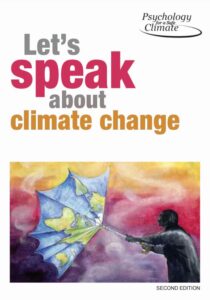
National Climate Emergency Summit
In February 2020, the National Climate Emergency Summit in Melbourne brought together Australian and international scientists, psychologists, researchers, communicators, lawyers, doctors, fire fighters, economists, business people, politicians and activists. It presented workshops, panel discussions and debates that tackled critical issues spanning the political, economic, technical, and social change dimensions of initiating and carrying out a full-scale response to the climate emergency.
At the end of the summit a Safe Climate Declaration was initiated by Kerryn Phelps, John Hewson, Peter Garret, Carmen Lawrence, Ian Dunlop, Tim Costello and Greg Mullins. This Declaration calls for a new approach to climate action in Australia, a response to match the scale of the threat as climate-warming impacts escalate across Australia and around the world. AAEE NSW is one of the 3,280 signatories to the Safe Climate Declaration.
You can watch and listen to the main stage and breakout sessions here to get up to speed on what the climate crisis means for Australia and how we all have a role to play in shaping Australia’s emergency transition.
The session of great relevance to environmental educators was ‘Getting the message right: framing emergency threat and response’.
This session brought Margaret Klein Salamon – Founding director of The Climate Mobilization, Rebecca Huntley – Australian social researcher and expert on social trends and Richie Merzian – Director Climate & Energy Program at The Australia Institute.
This panel discussed the power of language and how the way we frame an issue has the ability to ignite or switch people off. When the way we communicate has a big effect on attitudes and reactions, how do we get the climate message right to successfully mobilise people at the necessary scale and speed of action? How do we effectively communicate the scale and speed of action that is now required? How do we navigate the delicate terrain of facts, fear, courage, identity and reality?
Click here to listen to the podcast of ‘Getting the message right: framing emergency threat and response’ from the 2020 National Climate Emergency Summit.
Below are some of the most useful resources we have found to help communicate climate solutions and create a safe climate future for us all.
Project Drawdown
This is the world’s leading resource for climate solutions and self-proclaimed “most comprehensive plan ever to reverse global warming”. It includes a website, the 2017 book ‘Drawdown’ edited by renowned global sustainability leader Paul Hawken and Drawdown Review 2020 – a major update to their research and analysis of climate solutions that includes 10 key insights for possibility and action across sectors.
Drawdown is the future point in time when levels of greenhouse gases in the atmosphere stop climbing and start to steadily decline. This is the point when we begin the process of stopping further climate change and averting potentially catastrophic warming. It is a critical turning point for life on Earth.
To reach Drawdown, we must work on all aspects of the climate equation—stopping the sources of greenhouse gas pollution, supporting and enhancing the sinks of carbon dioxide found in nature, and helping society achieve broader transformations.
Project Drawdown is our ‘go to’ for understanding the top 80 current solutions to the climate crisis and the impact that these can have on our global carbon budget through both reducing carbon emissions and sequestering carbon.
The Future We Choose
This inspirational, quick and easy to read book includes the ten actions that are necessary for us as individuals to face the climate crisis and are necessary for us as a global community to solve the climate crisis. A must read. Visit the website Global Optimism to find out where to buy The Future We Choose: Surviving the Climate Crisis.
The Climate Council
The Climate Council is Australia’s leading independent climate change communications organisation, with comprehensive up to date resources including reports, media releases, videos, infographics, podcasts, mythbusting, communication guides and explainers.
The Climate Council was founded in 2013 by tens of thousands of Australians to create a new, independent and 100% community-funded organisation in response to the abolition of the Australian Climate Commission by the federal government. Within a few days of the abolishment of the Commission, it’s sacked Commissioners including Tim Flannery launched the new Climate Council and famously raised over $1 million in 24hrs from the public, the biggest crowd-funding campaign in Australia’s history and the start of a new page in Australia’s climate action.
The Climate Council is our first port of call for understanding the up-to-date science of the climate crisis and the current issues, achievements, advocacy and ambition in climate action and solutions around Australia.
2040 The Regeneration Movement
What started as an inspirational film by Australian Director Damon Gameau in May 2019 has turned into an amazing movement with an inspirational website showcasing the world’s climate solutions through films and videos. The New York times described 2040 as “Damon Gameau’s documentary is an accessible, informative and optimistic look at solutions to the climate crisis”.
The ‘2040Film’ social media channels provide inspirational stories of climate solutions and calls to action for us all. The film is now available on DVD for schools in Australia and New Zealand. A must see.
Regenerating Australia
What would Australia look like in 2030 if we simply listened to the needs of the people? Regenerating Australia is the new mockumentary by Australian Director Damon Gameau, currently touring around NSW. The film and accompanying impact campaign is seeking to accelerate the transition to a regenerative future.
1 Million Women
Launched in 2009 by Natalie Isaacs, former owner of the Body Shop, 1 Million Women is now a movement of over 950,000+ women and girls (and growing everyday) from every corner of the planet building a lifestyle revolution to fight the climate crisis.
This is a great inclusive movement for women (and men) new to environmental issues and for those of us wishing to influence our family and friends, with engaging posts to share on social media about climate solutions as diverse as divestment to reducing food waste.
Natalie recently launched her book Every Woman’s Guide to Saving the Planet, a practical tool kit for reducing your carbon footprint and mobilising your community around the biggest issue of our time – climate change. With loads of tips, tricks, easy-to-understand info graphics and an inspiring can-do message, this book is for every woman who wants to make a difference.
Groundswell
Groundswell is a new Giving Circle created in 2020 in response to the Climate Crisis, accelerating action and supporting solutions by funding high-impact climate advocacy in Australia. It is a community of people who know that the Climate Crisis has arrived, and that it’s up to every one of us to actively be part of the solution.
Groundswell has a short & sweet Climate Crisis Basics page and a more extensive Resources page with an engaging Groundswell Webinar 1 to help you learn the basics about the climate crisis, it’s solutions, and how powerful we are. Anna Rose, Groundswell co-founder and 20 year climate campaigner, shares:
- 4 numbers to explain the climate crisis.
- 4 reasons for hope – where solutions to the climate crisis lie.
- 4 ways to take action on climate – how we each can work to build the movement, change the story, shift the money and change the politics.
Groundswell also has a great list of the top ten climate actions for harnessing your personal, social, consumer and political power to win the war on climate inaction.
While the reality of the climate crisis can overwhelm, the good news is that the solutions to the climate crisis already exist!
In the absence of strong leadership at the federal level of government, a whole of community approach is the only way to solve the climate crisis. Many of us in Australia are playing our role and there are many great examples of climate leadership in our businesses, state governments, local governments, organisations, communities and individuals.
The changes we are making though are not happening fast enough to address the urgency of the climate crisis, and this is where we have a big opportunity as environmental educators.
The following four major pieces of work* are required if we are going to make progress on climate change in Australia:
1.Build a movement
2.Change the story
3.Shift the money
4.Change the politics
*This is a strategy framework that was developed for the Climate Action Network Australia by Sam La Rocca. For more information about these four ways to take action on climate, watch the engaging Groundswell Webinar 1 by Groundswell co-founder Anna Rose from April 2020 on the Groundswell resources page.
As environmental educators we have a role to play in ‘changing the story’. We can educate our communities that we are in a climate crisis and that there are affordable and scalable solutions that exist right now to solve this crisis and create a healthy, just and sustainable world.
We have the know how to make change fast, and plans to support communities most directly affected by change. And change can happen fast when we really apply our effort: the COVID-19 pandemic in 2020 has shown just how rapidly we can change when our government decides to make it their number one priority.
The steps to a safe climate will also build a better and more livable world: clean energy, better-designed cities, comfortable homes, healthier food, less waste, regenerative farming and the recovery of the natural world.
Read more
Building your personal resilience
Find out more
Understanding the climate crisis
Find out more

